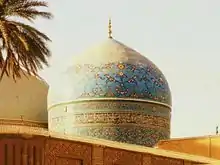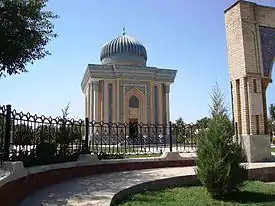Mahmud Hudayi
Aziz Mahmud Hudayi (1541–1628), (b. Şereflikoçhisar, d. Üsküdar), is amongst the most famous sufi ermiş's (Muslim saint) of the Ottoman Empire. He was a mystic, poet, composer, author, statesman and Hanafi Maturidi Islamic scholar.[1]
| Part of a series on Islam Sufism |
|---|
 Tomb of Abdul Qadir Gilani, Baghdad, Iraq |
|
List of sufis |
|
|
Life
Born in Şereflikoçhisar, he completed his studies in a medrese in Istanbul. He was the Sheikh of Sultan Ahmed I who constructed the famous Blue Mosque and especially gained the respect of Sultan Murad III. He read the first Friday prayer in this mosque on its opening. He is a descendant of Junayd of Baghdad, and being descendant of Husayn ibn 'Ali, he is a sayyid. He is therefore of Hashemite ancestry.[2]
He founded the sufi order Jelveti. He also served as qadi in Edirne, Egypt, Sham (Syria), and Bursa. He was a murid and khalifah of Üftade Hazretleri. He wrote about thirty works, seven of which are in Turkish. His disciple was Mustafa Gaibi, a prominent sufi from Ottoman Bosnia.
His following supplication has prompted many sailors of the Ottoman Empire to visit his grave before going out to sea:
Those who visit us when we are alive, and those who visit our grave after our death and read the Fatiha when passing by our tomb are ours. May those who love us not drown at sea, may they not suffer poverty in their old age, and may they not pass away without saving their faith.[3]
He died in Üsküdar, Istanbul and is buried next to his mosque.
Four Patron Saints of the Bosphorus
He along with Yahya Efendi, Telli Baba, and Joshua are considered to be the Four Patron Saints of the Bosphorus.
See also
- Mustafa Devati, a successor
References
- "Aziz Mahmud Hudayi (1543–1628) (ra) – Uskudur, Istanbul". Archived from the original on 2015-07-09. Retrieved 2015-07-08.
- "AZÎZ MAHMÛD HÜDÂYİ HAZRETLERİ'NİN HAYATI | Hüdayi Vakfı".
{{cite web}}: CS1 maint: url-status (link) - "Life of Aziz Mahmud Hüdayi | Hudayi Foundation" (in Turkish). Retrieved 2020-11-17.
| |||||||||||||||||||
| |||||||||||||||||||
| 2nd/8th |
|
|---|---|
| 3rd/9th |
|
| 4th/10th |
|
| 5th/11th |
|
| 6th/12th |
|
| 7th/13th |
|
| 8th/14th |
|
| 9th/15th |
|
| 10th/16th |
|
| 11th/17th |
|
| 12th/18th |
|
| 13th/19th |
|
| 14th/20th |
|
| 15th/21st |
|
Scholars of other Sunni Islamic schools of jurisprudence
| |
| Maturidi scholars |
|  | ||||||||||||||||||||||||
|---|---|---|---|---|---|---|---|---|---|---|---|---|---|---|---|---|---|---|---|---|---|---|---|---|---|---|
| Theology books | ||||||||||||||||||||||||||
| See also | ||||||||||||||||||||||||||
Maturidi-related templates
| ||||||||||||||||||||||||||
Authority control | |
|---|---|
| General | |
| National libraries | |
| Other | |